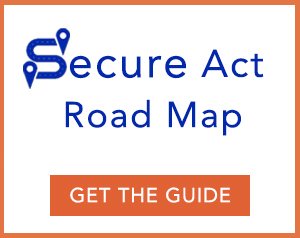Show Me the Money!
Working Savers get more Privileges in Retirement Savings Accounts.
Good News, you have more options!
This group of changes is intended to make it easier for smaller employers to give retirement savings programs, and make it easier for those nearing retirement to know what they can count on as income from their savings.
Why is this important?
The intention of the provisions below is to make it easier and more clear for all to have a retirement plan, and know what that translates into for predictable income in retirement. Our concern is a false sense of security from all the information presented.
The SECURE Act signed December 19th, 2019, is the law for 2020 and beyond.
1. Section 107. Qualified Employer Plans Prohibited from Making Loans through Credit Cards and Other Similar Arrangements
The legislation prohibits the distribution of plan loans through credit cards or similar arrangements. The change will ensure that plan loans are not used for routine or small purchases, thereby preserving retirement savings.
This is a bit ‘big brother’, but it does make sense not to be able to nickel and dime your retirement savings out of where it belongs.
2. Section 108. Portability of Lifetime Income Options
The legislation permits qualified defined contribution plans, section 403(b) plans, or governmental section 457(b) plans to make a direct trustee-to-trustee transfer to another employer-sponsored retirement plan or IRA of lifetime income investments or distributions of a lifetime income investment in the form of a qualified plan distribution annuity, if a lifetime income investment is no longer authorized to be held as an investment option under the plan. The change will permit participants to preserve their lifetime income investments and avoid surrender charges and fees.
This is a fantastic rule to allow savers to have the option to continue to depend on the savings plan that was set up. Warning – the provision to roll your previous company retirement savings to your new employer is typically not recommended. Whenever you have the opportunity to roll your retirement savings to your own IRA, it generally is in your best interest. You can even keep it with the same custodian, but it is much better protected under IRA rules up to $1million of contributions.
3. Section 202. Combined Annual Reports for Group of Plan
The legislation directs the IRS and DOL to effectuate the filing of a consolidated Form 5500 for similar plans. Plans eligible for consolidated filing must be defined contribution plans, with the same trustee, the same named fiduciary (or named fiduciaries) under ERISA, and the same administrator, using the same plan year, and providing the same investments or investment options to participants and beneficiaries. The change will reduce aggregate administrative costs, making it easier for small employers to sponsor a retirement plan and thus improving retirement savings.
This is intended to make it easier for employers to offer and administer company savings plans. I hope the execution of it is as promising as the intent.
4. Section 203. Disclosure Regarding Lifetime Income
The legislation requires benefit statements provided to defined contribution plan participants to include a lifetime income disclosure at least once during any 12-month period. The disclosure would illustrate the monthly payments the participant would receive if the total account balance were used to provide lifetime income streams, including a qualified joint and survivor annuity for the participant and the participant’s surviving spouse and a single life annuity. The Secretary of Labor is directed to develop a model disclosure. Disclosure in terms of monthly payments will provide useful information to plan participants in correlating the funds in their defined contribution plan to lifetime income. Plan fiduciaries, plan sponsors, or other persons will have no liability under ERISA solely by reason of the provision of lifetime income stream equivalents that are derived in accordance with the assumptions and guidance under the provision and that include the explanations contained in the model disclosure.
This is a helpful calculation some employers provide already to give an idea of what exactly you could expect from your retirement savings in the form of a monthly income. This is nice because a decade or so ago, many workers had pensions. This type of reporting helps determine how things may look financially when you start the retirement honeymoon.
5. Section 204. Fiduciary Safe Harbor for Selection of Lifetime Income Provider
The legislation provides certainty for plan sponsors in the selection of lifetime income providers, a fiduciary act under ERISA. Under the bill, fiduciaries are afforded an optional safe harbor to satisfy the prudence requirement with respect to the selection of insurers for a guaranteed retirement income contract and are protected from liability for any losses that may result to the participant or beneficiary due to an insurer’s inability in the future to satisfy its financial obligations under the terms of the contract. Removing ambiguity about the applicable fiduciary standard eliminates a roadblock to offering lifetime income benefit options under a defined contribution plan.
This is another ideal sounding provision that will remain to be seen how it works itself out in application and enforcement. Suffice it to say, when signing your ‘life savings’ over to a company in exchange for a promise of income, great caution and prudence is encouraged. We get a lot of inquiries on proposals that sound a bit too good to be true or when you just want a third party to affirm what you hope to be true.

As Promised …
1. What you need to know-
Any chance you get, roll your company savings plan to your IRA.
Pay attention to the retirement income numbers, AND ask these questions to keep yourself out of trouble.
Important Retirement Questions: Exit Strategy, Control, & Adapt / Adjust
2. How it may or may not affect you-
This should make it easier for you to have more information and hopefully, confidence in your retirement plan.
3. What to ask your CPA, Attorney, or Financial Professional-
This biggest challenge on this topic is being certain you’re getting insights from someone who knows the specifics of this particular topic. Unfortunately, well-meaning professionals are influencing savers just trying to be helpful but giving incomplete or bad information on complicated scenarios they think they know. Ask these questions to get a better idea of who you are talking to and if their area of expertise is likely to fit your changing needs.
7 Basic Questions You Should Ask Every Financial Advisor You Meet
4. How to know if you are doing it right-
Keep asking questions of someone you are comfortable is looking at the big picture AND all the little details of your plan.
Rest assured, as we further evaluate this new piece of retirement legislation, we will continue to give you insights on what you need to know to not miss out on the opportunities that you may benefit from going forward.
More to Come …
George Wells
Ps. As always, when you have specific questions or need specific application insights, drop us a line. Life is too short to not – Retire Happily!
I believe …
If it’s not worth Sharing, it’s not worth Sending. Let us know what you think of how we endeavor to make the complex simple and easy to know you are doing it right
… And Share it with your friends, family, and even the ones who you think are probably all set. We are all in this Together!
Retire Happily!
Reference: Secure Act









